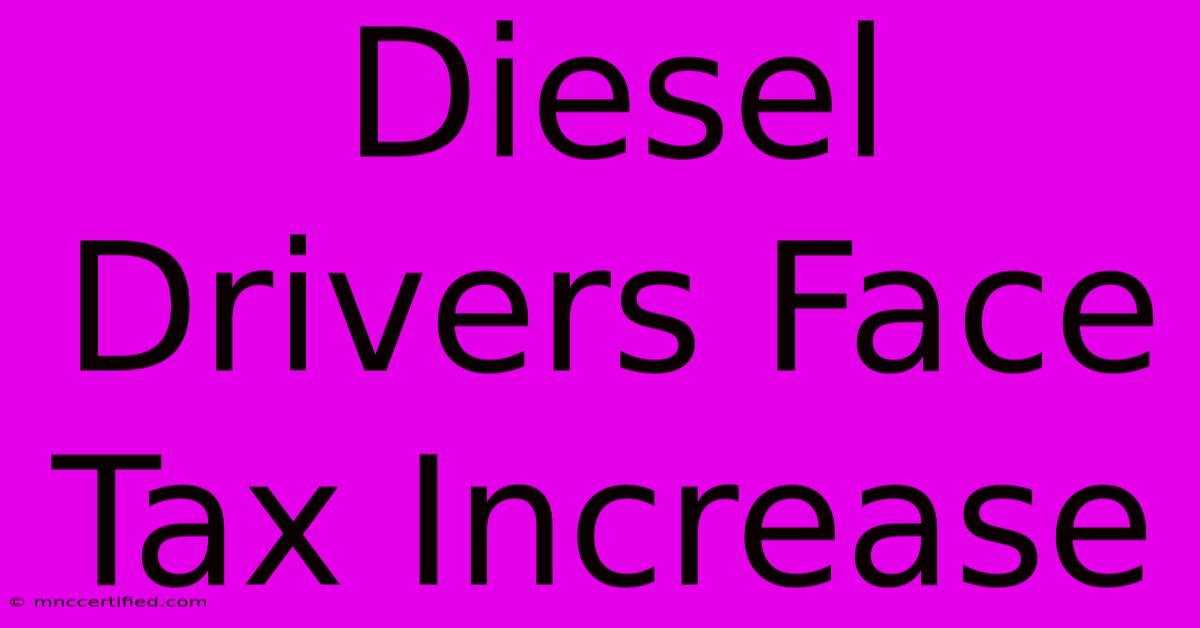Diesel Drivers Face Tax Increase

Table of Contents
Diesel Drivers Face Tax Increase: What You Need to Know
The rising cost of living is hitting everyone hard, but for diesel drivers, the pain is particularly acute. A recent tax increase on diesel fuel is sending shockwaves through the industry, impacting everyone from long-haul truckers to farmers and construction companies. This article will delve into the details of this tax hike, exploring its implications and what drivers can do to mitigate its effects.
Understanding the Diesel Tax Increase
The recent increase in diesel taxes represents a significant financial burden on those who rely on diesel fuel. While the exact percentage varies depending on location and specific legislation, the general trend is upward. This rise is often attributed to several factors, including:
- Government revenue generation: Governments often increase fuel taxes to fund infrastructure projects, such as road repairs and public transportation initiatives.
- Environmental concerns: Higher taxes on diesel fuel are sometimes implemented to encourage a shift towards cleaner, more sustainable alternatives. Diesel emissions are a significant contributor to air pollution.
- Global market fluctuations: The price of crude oil, a key component in diesel production, fluctuates significantly on the global market. This volatility directly impacts the final price at the pump, and tax increases can exacerbate the issue.
Who is Affected by the Diesel Tax Increase?
The impact of the diesel tax increase is far-reaching, affecting a broad spectrum of industries and individuals:
- Long-haul truck drivers: These drivers are among the hardest hit, as fuel costs represent a substantial portion of their operating expenses. Increased fuel prices can directly impact their profitability and potentially lead to higher shipping costs for consumers.
- Farmers and agricultural businesses: Diesel fuel is essential for operating farm machinery, from tractors to harvesters. Higher taxes translate to increased production costs, potentially leading to higher food prices.
- Construction companies: Heavy machinery used in construction relies heavily on diesel fuel. Increased fuel costs can delay projects and increase overall construction expenses.
- Delivery services: Businesses relying on delivery trucks, like e-commerce companies and logistics providers, face increased operational costs, which may be passed on to consumers in the form of higher prices.
Mitigating the Impact of Increased Diesel Taxes
While the tax increase is unavoidable in the short term, there are steps drivers and businesses can take to mitigate its financial impact:
- Improve fuel efficiency: Investing in fuel-efficient vehicles, regularly maintaining vehicles, and adopting fuel-saving driving techniques can significantly reduce fuel consumption.
- Explore alternative fuels: Investigating alternative fuel sources like biodiesel or renewable diesel can help reduce reliance on traditional diesel fuel, though the availability and cost of these alternatives vary.
- Negotiate with fuel suppliers: Building strong relationships with fuel suppliers and negotiating bulk discounts can help lower the overall cost of fuel.
- Lobbying and advocacy: Participating in advocacy efforts to influence government policies related to fuel taxes and subsidies can contribute to long-term solutions.
- Strategic route planning: Optimizing routes to minimize mileage and avoid unnecessary idling can help reduce overall fuel consumption.
The Future of Diesel Fuel and Taxation
The future of diesel fuel and its taxation remains uncertain. Governments are increasingly focused on reducing carbon emissions, which may lead to further tax increases or incentives for transitioning to alternative fuels. Staying informed about evolving legislation and market trends is crucial for diesel drivers to adapt and navigate this dynamic landscape. Active participation in industry associations and continuous monitoring of government policies are key to mitigating the long-term impact of diesel tax increases.
Keywords: Diesel tax increase, diesel fuel prices, trucking industry, agriculture, construction, fuel efficiency, alternative fuels, government policy, fuel tax, rising fuel costs, diesel drivers, impact of diesel tax, mitigating fuel costs.

Thank you for visiting our website wich cover about Diesel Drivers Face Tax Increase. We hope the information provided has been useful to you. Feel free to contact us if you have any questions or need further assistance. See you next time and dont miss to bookmark.
Featured Posts
-
Car Tax Hikes 5 490 Possible
Nov 26, 2024
-
East Carolina Bonded Warehouse
Nov 26, 2024
-
Watch Ronaldos Two Goals Vs Al
Nov 26, 2024
-
U Conn Coach Hurley Finds Next Star
Nov 26, 2024
-
Insurance Companies Florence Ky
Nov 26, 2024